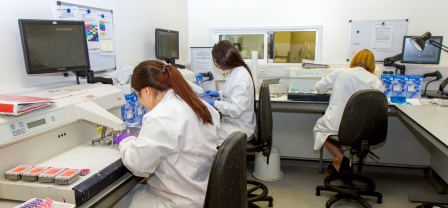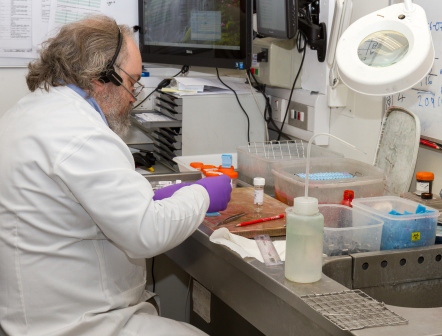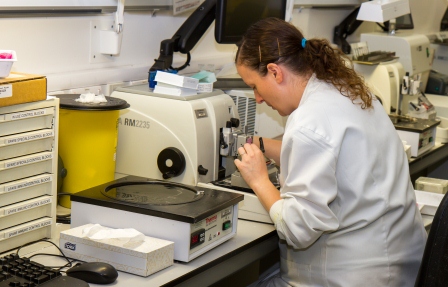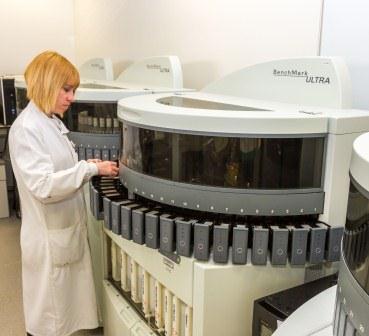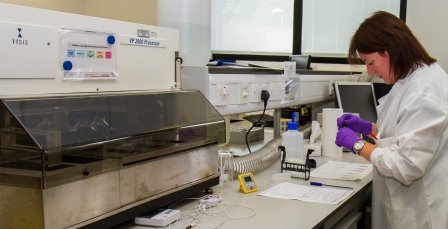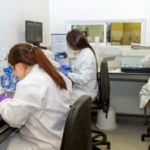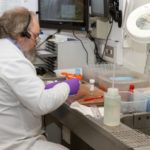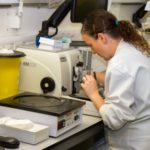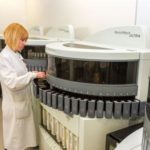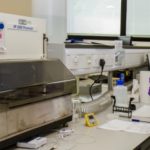Cellular Pathology is assessed by the National Pathology accreditation body United Kingdom Accreditation Service (UKAS) against ISO 15189:2012 standards.
Information about UKAS accredited repertoire scope.
Specimen requirements and turnaround times
Overview of Cell Path repertoire and Turnaround Times
For detailed specimen requirements, test repertoire and turnaround times please see the relevant link below.
- Histology repertoire and turnaround times
- Diagnostic Cytology
-
- Diagnostic Cytology sample requirements
- User guide for preparation of direct smears for Diagnostic Cytology
- Molecular Histopathology – see Molecular Histopathology section below
Diagnostic Cytology (non gynae)
- For specimen and container requirements see the Test catalogue.
- Guide for preparation of direct slides for Diagnostic Cytology
Diagnostic Cytology is the study of the microscopic anatomy of cells from people. It is commonly performed by examining cells under a light microscope, which have been stained and mounted on a microscope slide Urgent requests are defined as those essential for the management of the patient. These should be highlighted by the requesting Clinician by writing ‘Urgent’ on the request form together with a contact telephone number. Cases are reported by Specialty teams within Cellular Pathology. The turnaround time target is 7 days from sample taking to result issued.
Frozen sections
All Frozen sections must be pre-booked by phoning 01622 227468 The laboratory requires 48 hours prior notice. This is to ensure availability of key lab staff, a reporting consultant and the readiness of the necessary equipment .
Histology
Histology is the study of the microscopic anatomy of cells and tissues of people. It is commonly performed by examining cells and tissues under a light microscope, which have been sectioned, stained and mounted on a microscope slide Histopathology, the microscopic study of diseased tissue, is an important tool in anatomical pathology, since accurate diagnosis of cancer and other diseases usually requires histopathological examination of samples. Pathologists, are the personnel who perform histopathological examination and provide diagnostic information based on their observations.
Additional Tests
Formalin fixed specimens sent for investigation are only kept for six weeks after the case has been reported before disposal. After this time only processed wax blocks and slides are available for further review. There will be occasions during treatment when the reported pathology is insufficient for patient management. Contact the reporting pathologist immediately to discuss additional investigations.
Referral Centres used by MTW Cellular Pathology
Occasionally material may be referred to an alternative centre in order to obtain the opinion of a recognised expert in a field, or for rarely performed/specialist testing. There is a list of cellular pathology referral centres.
In order to determine that all referral centres meet the requirements of this Department’s quality management system regular requests are sent out to all referral centres used in the past year asking for that laboratory’s: • ISO status • EQA performance • Performance with regard to their published turnaround time. When the report is received back from the referral laboratory, it is added to the existing MTW report as a Supplementary Report, clearly identified as being performed by a referral laboratory or Consultant. MTW Consultants remain responsible for ensuring that the examination results of the referral laboratory are provided to the requesting clinician. Please email requests for reports, slides or blocks to mtw-tr.Histoffice@nhs.net
Molecular Histopathology
A broadest definition of molecular pathology is the study of molecules in a disease state. In this context, the molecules studied are DNA, RNA and/or protein. Portions of DNA (known as genes) act as templates for the production of RNA which in turn acts as a template for the production of protein. Molecular pathology tests may look for the presence or absence of protein or RNA, or for an increase or decrease in the amount of these molecules. Molecular Histopathology uses molecular testing to predict the response of certain ‘solid’ cancers to specific drugs. This predictive testing forms the basis of ‘personalised medicine’ for such cancer patients, and includes: HER2 testing in breast and gastric cancer; EGFR and ALK testing in lung cancer; BRAF testing in melanoma; and RAS testing in colorectal cancer. This form of predictive testing is currently a particular growth area in molecular pathology.
- Molecular pathology request form
- Molecular pathology user manual (updated Jan 2024)

